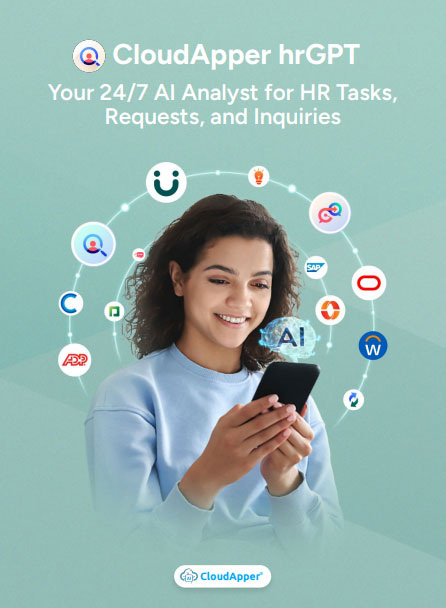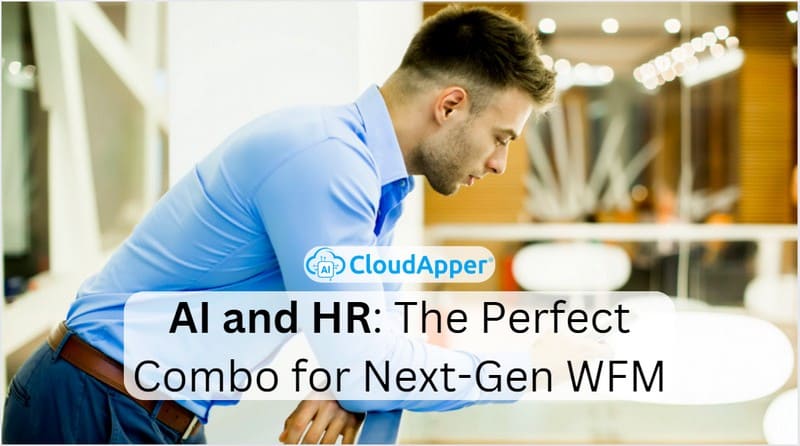Find out how AI is being used and HR are used together and how CloudApper hrGPT is a prime example of it.
Table of Contents
An organization’s most important resource, its workforce, is managed by the HR department, but that’s not the only responsibility HR teams have. They must manage recruitment, improve employee engagement, ensure compliance, update policies, and more. Conventional HR procedures are frequently criticized for being labor-intensive, resource-intensive, and occasionally prone to errors. This is where AI comes into play, revolutionizing workforce management and having a significant impact on how HR teams work. That being said, let’s take a look at how artificial intelligence and HR create the perfect combination for immaculate workforce management and how CloudApper hrGPT helps with it.
How Is Artificial Intelligence Used in HR?
The primary use of AI in HR is to improve and accelerate a wide range of HR tasks by automating, simplifying, or streamlining them. This includes hiring, employee engagement, exit interviews, HR query management, and more.
Artificial intelligence and HR or HCM systems are used together thanks to AI-powered solutions seamlessly integrating into existing workflows and systems. Using these solutions helps HR professionals make better decisions and automate repetitive tasks – here are a few essential uses:
Recruitment and Candidate Screening
AI-powered solutions are able to examine resumes and job applications, match applicants with positions, and evaluate their qualifications to streamline the hiring process and reduce HR burden.
Employee Onboarding and Offboarding
AI can reduce the amount of manual work that HR teams must perform by streamlining the onboarding process, assisting new hires with their initial steps, and even conducting exit interviews.
Policy and Procedure Queries
AI-driven HR chatbots like CloudApper hrGPT can instantly respond to HR-related queries, ensuring that workers always have access and answers to important data, HR policies, and more.
Feedback and Employee Engagement
AI-powered surveys can detect patterns, measure employee satisfaction, and assist HR departments in implementing focused engagement-boosting initiatives.
Learning and Development
Based on an employee’s roles, performance, and career goals, AI can suggest individualized training and development programs.
Benefits and Compensation
AI-driven systems are capable of responding to questions about employee benefits, pay, and even managing leave requests.
Attendance and Leave Management
HR departments can effectively handle shift scheduling, attendance, and leave requests by utilizing AI solutions.
How Can AI Improve HR Operations?
There are several advantages to utilizing artificial intelligence and HR systems in unison, some of which are:
- Increased Efficiency: HR professionals can save time and minimize errors by automating repetitive tasks like manual data entry, document processing, manual data analysis, and more.
- Cost Reduction: Since AI automates HCM tasks, errors are minimized while taking less time – resulting in significant cost savings.
- Enhanced Compliance: AI can help with adherence to HR policies by informing employees about recent updates and assisting with compliance without the involvement of HR teams – reducing their burden.
- Employee Self-Service: AI-powered HR assistants like CloudApper hrGPT can give employees 24/7 access to HR support. For instance, hrGPT easily handles employee queries, leave requests, HR policies, and more.
- Enhanced Employee Engagement: Prompt customized answers to employee queries and feedback result in a more involved workforce, which improves general productivity and satisfaction.
Is HR Ready for AI?
For many organizations, using AI in HR may seem like a daunting transition. HR departments might be worried about employee resistance, AI systems’ flexibility, and data privacy. Nevertheless, the advantages greatly exceed the difficulties.
AI in HR aims to enhance HR professionals’ abilities rather than replace them. AI-powered solutions like those by CloudApper help take care of tedious, repetitive, and mundane tasks, freeing up HR teams to concentrate on more strategic and value-driven work. In fact, AI tools have the potential to become teams’ most valuable allies in HR operations, guaranteeing compliance with HR policies, assisting in better employee support, and ultimately enhancing the overall work experience.
As already mentioned, employees typically need assistance from HR teams in a variety of ways concerning accruals, HR policies, information updates, and other matters. HR teams may find these responsibilities taxing, particularly in larger businesses. The tool organizations need is a combination of artificial intelligence and HR systems in order to streamline, automate, or optimize HCM tasks, relieving the workload on HR teams and offering employees round-the-clock HR support.
CloudApper hrGPT – Your AI-Powered HR Assistant
CloudApper’s hrGPT is a prime example of how AI is revolutionizing HR. It is an AI-powered HR assistant that automates HCM tasks and offers employees 24/7 HR support. It integrates seamlessly with existing HR/HCM systems – eliminating any data migration headaches. It performs exceptionally well in various use cases and benefits both HR departments and employees.
Providing Employee Self-Service
hrGPT gives employees the ability to easily manage their leave requests, view schedules, check accrual balances, and carry out other self-service HR tasks. Employee satisfaction is increased while reducing the HR team’s workload significantly.
Resolving HR-Related Questions
hrGPT can quickly and consistently respond to questions regarding HR policies, procedures, or any other HR-related topic, ensuring that employees always have access to critical HR data without involving the HR team.
Conducting Smart Surveys
Using AI and natural language understanding, hrGPT can conduct smart surveys based on conversational input, giving HR teams insightful information and highlighting trends in employee sentiment.
Assisting Employees With Accruals
By automating the process of verifying their accrual balances for vacation, sick leave, or other benefits, employees can use hrGPT to cut down on manual labor for HR.
Assisting With Candidate Acquisition
hrGPT streamlines the hiring process and increases candidate engagement by providing candidates with a seamless process for applying for the job in question.
Talent Management
Internal mobility, learning and development, and employee onboarding are all more accessible with hrGPT. It guides a more effective talent management process, automates data collection, and analyzes skill gaps.
There is no denying the advantages of utilizing both artificial intelligence and HR – CloudApper hrGPT clearly showcases that. Employee engagement increases substantially, errors are reduced, and HR teams are not overworked as a result of offering 24/7 HR support, all of which contribute to a more effective and productive workforce.
Are You Using the Perfect Combo of Artificial Intelligence and HR Systems?
To sum up, AI in HR is no longer a sci-fi idea; modern companies have already begun to use it. One excellent illustration of how AI can improve HR operations and make them more productive and efficient is CloudApper hrGPT. AI in HR is undoubtedly the way of the future, and companies that use it will lead the workforce management space thanks to its smooth integration and variety of applications.
Organizations can optimize HR operations, cut costs, and improve employee satisfaction by implementing AI-powered HR solutions like CloudApper hrGPT. This will help them be better equipped to handle the opportunities and challenges presented by the next generation of workers. Is HR prepared for AI, then? Indeed, the advantages of this ideal combination are already being felt by it – contact us now to learn how we can help you adopt AI into your existing HCM/HR system.
What is CloudApper AI Platform?
CloudApper AI is an advanced platform that enables organizations to integrate AI into their existing enterprise systems effortlessly, without the need for technical expertise, costly development, or upgrading the underlying infrastructure. By transforming legacy systems into AI-capable solutions, CloudApper allows companies to harness the power of Generative AI quickly and efficiently. This approach has been successfully implemented with leading systems like UKG, Workday, Oracle, Paradox, Amazon AWS Bedrock and can be applied across various industries, helping businesses enhance productivity, automate processes, and gain deeper insights without the usual complexities. With CloudApper AI, you can start experiencing the transformative benefits of AI today. Learn More

CloudApper AI Solutions for HR



- Works with








- and more.
Similar Posts

Best Practices for AI in Workforce Management: What Every HR…

Why HR Process Automation is the Future of Workforce Management








